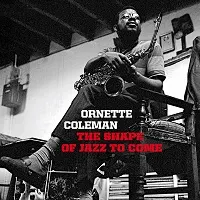Styles: Saxophone Jazz
Year: 1959
File: MP3@320K/s
Time: 52:53
Size: 122,1 MB
Art: Front
(5:32) 1. If This Isn't Love
(5:34) 2. I Guess I'll Hang My Tears Out To Dry
(4:16) 3. Serenata
(3:39) 4. I've Told Ev'ry Little Star
(7:03) 5. Barefoot Sunday Blues
(5:10) 6. Poor Butterfly
(6:55) 7. I Remember You
(7:48) 8. Barefoot Sunday Blues - Alternate Take
(6:52) 9. I Remember You - Alternate Take
Cannonball Takes Charge
Year: 1959
File: MP3@320K/s
Time: 52:53
Size: 122,1 MB
Art: Front
(5:32) 1. If This Isn't Love
(5:34) 2. I Guess I'll Hang My Tears Out To Dry
(4:16) 3. Serenata
(3:39) 4. I've Told Ev'ry Little Star
(7:03) 5. Barefoot Sunday Blues
(5:10) 6. Poor Butterfly
(6:55) 7. I Remember You
(7:48) 8. Barefoot Sunday Blues - Alternate Take
(6:52) 9. I Remember You - Alternate Take
The recording of Cannonball Takes Charge was sandwiched in between two events that would help earn Cannonball Adderley a permanent place in jazz lore. Just the day before the album’s first session, he participated in the completion of Miles Davis’s seminal Kind of Blue. Five months after Cannonball Takes Charge was finished, he had Riverside producer Orrin Keepnews record his newly formed quintet at the Jazz Workshop in San Francisco which helped launch his career as one of the leading proponents of “soul jazz.” But what about the album made in between these two momentous occasions? Cannonball Takes Charge ’s concept was a common one: the altoist is the lone horn in a quartet performing a program made up primarily of standards. The results are anything but routine though, and show that 1959 was a very good year for Cannonball Adderley. The opening tune, “If This Isn’t Love,” kicks off the proceedings on an ebullient note with Adderley playing an infectious solo that can brighten even the gloomiest day.
Things reach a more melancholic note only on “I Guess I’ll Hang My Tears Out To Dry” which features a fine ballad performance by the alto saxophonist. “Barefoot Sunday Blues,” the lone original composition, points to the gospel and soul-inflected jazz that would become Adderley’s calling card. The final selection, “I Remember You,” produces his finest performance on the album. Adderley is able to coax a five-chorus improvisation out of the standard’s changes that is always interesting and full of romantic lyricism. On the piano bench is Wynton Kelly who plays with the utmost of taste throughout. He makes his best impression when he dips in to a more earthy vibe on his last solo chorus of “Barefoot Sunday Blues” and in his work on “Poor Butterfly.” Joining Adderley and Kelly are Paul Chambers and Jimmy Cobb on four tracks, and Percy and Albert Heath on the rest. As an added bonus, this 2002 CD reissue adds alternate takes of “Barefoot Sunday Blues” and “I Remember You” that are well worth listening to. Adderley would rarely revisit the territory he covered in Cannonball Takes Charge in the years to come. His subsequent work on Riverside increasingly began to follow a formula: albums recorded live with the altoist’s working band. In 1961 though, Adderley would record another quartet album, Know What I Mean? , in which he managed to surpass the lofty heights achieved on Cannonball Takes Charge. ~ Robert Gilbert https://www.allaboutjazz.com/cannonball-takes-charge-julian-cannonball-adderley-capitol-records-review-by-robert-gilbert.php
Personnel: Cannonball Adderley - alto saxophone; Wynton Kelly - piano; Paul Chambers, Percy Heath - bass; Jimmy Cobb, Albert Heath - drums
Things reach a more melancholic note only on “I Guess I’ll Hang My Tears Out To Dry” which features a fine ballad performance by the alto saxophonist. “Barefoot Sunday Blues,” the lone original composition, points to the gospel and soul-inflected jazz that would become Adderley’s calling card. The final selection, “I Remember You,” produces his finest performance on the album. Adderley is able to coax a five-chorus improvisation out of the standard’s changes that is always interesting and full of romantic lyricism. On the piano bench is Wynton Kelly who plays with the utmost of taste throughout. He makes his best impression when he dips in to a more earthy vibe on his last solo chorus of “Barefoot Sunday Blues” and in his work on “Poor Butterfly.” Joining Adderley and Kelly are Paul Chambers and Jimmy Cobb on four tracks, and Percy and Albert Heath on the rest. As an added bonus, this 2002 CD reissue adds alternate takes of “Barefoot Sunday Blues” and “I Remember You” that are well worth listening to. Adderley would rarely revisit the territory he covered in Cannonball Takes Charge in the years to come. His subsequent work on Riverside increasingly began to follow a formula: albums recorded live with the altoist’s working band. In 1961 though, Adderley would record another quartet album, Know What I Mean? , in which he managed to surpass the lofty heights achieved on Cannonball Takes Charge. ~ Robert Gilbert https://www.allaboutjazz.com/cannonball-takes-charge-julian-cannonball-adderley-capitol-records-review-by-robert-gilbert.php
Personnel: Cannonball Adderley - alto saxophone; Wynton Kelly - piano; Paul Chambers, Percy Heath - bass; Jimmy Cobb, Albert Heath - drums
Cannonball Takes Charge




















